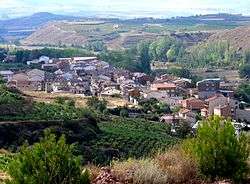Cárdenas (surname)
Cárdenas is a locational surname originated in La Rioja, Spain. It comes from a noble house of Viscay belonging to the low nobility. In Spain, Cárdenas is the 287th most frequently surname, accounting for 0.37% of the population. It is the 296th most popular surname in the Spanish autonomous community of Catalonia.[1]
 Cárdenas, La Rioja, Spain | |
| Pronunciation | ˈkarðɛˌnas |
|---|---|
| Origin | |
| Language(s) | Spanish |
| Meaning | Thistle (Carduus) |
| Region of origin | Spain |
| Other names | |
| Variant form(s) | Cardenas, de Cárdenas, Cárdena, Cardo, Cardenoza, Cardeño, Barcenas |
History
The origin of this surname can be found at the beginnings of the 13th century. It was given to Don Sancho López de Haro, grandson of Don Lope Díaz de Haro, IX Lord of Biscay. Don Sancho was given the title of I Lord of the villa of Cárdenas, in la Rioja, after his role in the battle of Navas de Tolosa in 1212. After him, his descendants inherited the surname.
Many of these Cárdenas people held important positions of influence in the Castillian politics through most of the late Middle Ages. As an example, we can find members of the Cárdenas house as knights of the Order of Calatrava, from the 13th to the 15th centuries, and also members like Don Alonso de Cárdenas, last Grand Master of the Order of Santiago, or Don Gutierre de Cárdenas, Mayor Treasurer of the Kingdom of Castille.
One of the most famous members of the Cárdenas family is García López de Cárdenas, Spanish conquistador of the 16th century and the first European who discovered the Grand Canyon in Colorado.
Etymology
Some theorists say that was originally used by people living in areas where "Cardenos" grew. Cardenos came from the Latin word "Carduus" which means Thistle. However, it's believed that its origin comes from the villa of Cárdenas, located in La Rioja in the north of Spain.
The Cárdenas came from northern Spain, and after the conquest of the Americas by the Spaniards, they spread into regions like Venezuela, Ecuador, Mexico, Peru and Cuba. The surname is also brought into the Philippines by the Spaniards during its 333 years of colonization.
People
- Adán Cárdenas (1836–1916), President of Nicaragua
- Adrian Cardenas (born 1987), American baseball player
- Agustín Cárdenas (1927–2001), Cuban sculptor
- Alberto Cárdenas (born 1958), Mexican politician
- Alejandro Cárdenas (born 1974), Mexican athlete
- Alicia Cárdeñas (born 1943), Mexican volleyball player
- Alonso de Cárdenas (fl. 1474–1493), Spanish noble
- Alonso de Cárdenas, Spanish ambassador to the English Commonwealth (1650s).
- Anahí de Cárdenas (born 1983), Peruvian singer and actress.
- Bartolomé de Cárdenas (1440-1501), Spanish painter, better known as Bartolomé Bermejo.
- Bartolomé de Cárdenas (1575-1628), Spanish painter, born in Portugal.
- Carlos Cárdenas (born 1976), Bolivian footballer
- Cuauhtémoc Cárdenas (born 1934), Mexican politician
- Eliécer Cárdenas (born 1950), Ecuadorian writer
- Félix Cárdenas (born 1973), Colombian cyclist
- Francisco Arias Cárdenas (born 1950), Venezuelan politician
- García López de Cárdenas (fl. 1540), Spanish Conquistador
- Gregorio Cárdenas Hernández (1915–1999), Mexican serial killer
- Henry Cárdenas (born 1965), Colombian road cyclist
- Jose Cardenas (born 1970), California real life character portrayed in "McFarland USA" film
- Lázaro Cárdenas Batel (born 1964), Mexican politician
- Lázaro Cárdenas del Río (1895–1970), President of Mexico
- Leo Cárdenas (born 1938), Cuban baseball player
- Luis Cárdenas (cyclist) (born 1967), Colombian cyclist
- Luis Cárdenas (footballer) (born 1993), Mexican footballer
- Luis Cárdenas Saavedra, Venezuelan educator
- Martín Cárdenas (botanist) (1899–1973), Bolivian botanist
- Martín Cárdenas (motorcycle racer) (born 1982), Colombian motorcyclist
- Mauricio Cárdenas Santa María (born 1962), Colombian politician
- Miguel Cárdenas (fl. 1894–1904), Mexican politician
- Osiel Cárdenas (born 1967), Mexican drug baron
- Raúl Cárdenas (born 1928), Mexican footballer and coach
- Regla Cárdenas (born 1975), Cuban heptathlete
- Raymundo Cárdenas (born 1950), Mexican politician
- Robert Cardenas (born 1920), American general
- Sherman Cárdenas (born 1989), Colombian football midfielder
- Steve Cardenas (born 1974), American martial artist, musician and retired actor
- Tony Cárdenas (born 1963), California politician